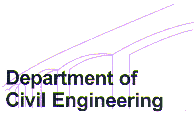

27-Feb-96
In an uncertain and increasingly competitive environment the Civil Engineer is required to develop a wide range of skills and abilities to stay abreast of current industrial needs. The Faculty of the Environment has recognised the need for a fresh approach to the provision of post graduate courses in Civil Engineering and has established this course within the Faculty Modular Masters Scheme.
Staffing of this pathway reflects the interdisciplinary approach to post-graduate study taken within the faculty. Most of the staff on the pathway have over fifteen years of teaching and research experience. Staff research interests cover a range of related issues and concerns which are developed through this course.
Attendance is offered in full-time (one-year), or part-time/block mode (two years) to maximise convenience of access. Each of the three stages of the programme is contained within an academic semester. The first two stages are generally delivered through formal tuition and stage three through personal research.
Successful completion of stage three dissertation/assignments will gain candidates another 40 credits which will enable them to exit the course with an MSc degree. The pass mark for all units is 50% and an overall mark of 75% gains the award of MSc with Distinction.
Coastal and Geotechnical Engineering - Provides understanding of the characteristics of a coastal environment as they relate to engineering works. Principles of embankment and earth fill dam design.
Human Resource Management and Legal Studies - Appreciation of the business and legal environment in which engineers work. Study decision making and modern management techniques.
Management of Traffic - Understand the traffic generation characteristics of land use, planning for traffic and its management and control.
Numerical Methods for Structural Analysis - Structural analysis and numerical techniques for solving structural problems. Use of commercial software packages.
Structural Design - Strategic approach to the design process and techniques for the design of complete structures.
Water and Environmental Management - Water management criteria. Industrial waste treatment and disposal.
Research Methods - A wide range of quantitative and qualitative research methods will be introduced and current issues of concern will be addressed. The intention is to assist participants to identify appropriate approaches to undertake their own independent research projects. All students will generate a detailed research proposal.
Two Additional Subjects - These can be selected from a number of appropriate units available from MSc courses in Construction Management, Coastal and Marine Resource Management or Bio-Climatic Architectural Design.
STAGE 3
Independent Project - This provides the MSc candidate with the opportunity to tackle independently, but in a supportive framework, a significant piece of work on a subject of their own choosing, which has been agreed with the Director of Studies. The duration of this work is at least one semester (i.e. 16 weeks).